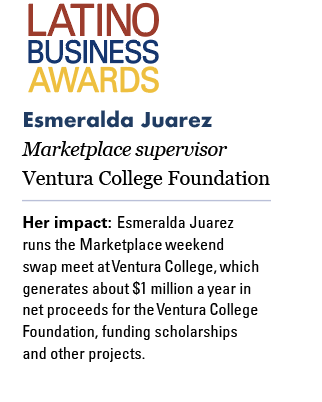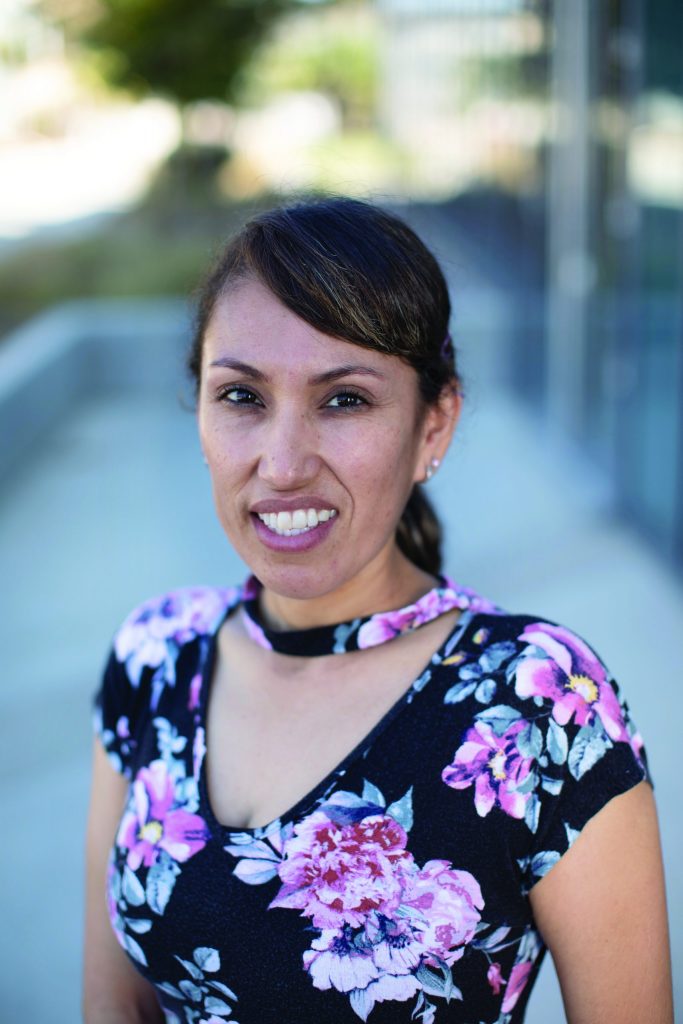By Tony Biasotti

Staff Writer
When Esmeralda Juarez was a teenager in Ventura, her family shopped at the weekend swap meet at the old 101 Drive-In movie theater. One day she met a vendor who spoke fluent Chinese and good English, but couldn’t communicate well with his Spanish-speaking customers. So Esmeralda went to work from him as an interpreter.
It was her first job, and it only lasted a few months. “I did not think I would end up working at a swap meet,” she says now.
Today, 25 years later, the 101 Drive In is long gone, and Juarez manages the only swap meet left in town: the Ventura College Foundation Weekend Marketplace.
Every Saturday and Sunday, hundreds of vendors line up in a parking lot at the east end of the community college’s campus to sell their wares. There are new and used clothes, toys, tools and other household goods, along with produce stands and food carts.
The Marketplace is a way for Ventura College to give back to the community, since it donates the use of its property, and for the community to support Ventura College, because the revenue from vendor fees goes supports scholarships and other Ventura College Foundation projects.
Before the pandemic slowed things down, the Marketplace generated about $1.5 million per year in gross revenue for the foundation, and about $1 million per year in net proceeds. Business returned to pre-pandemic levels by July 2021, said Anne King, the Ventura College Foundation’s executive director.
The Marketplace has been running for 35 years, and Juarez has worked there for the past 21. She became the supervisor in 2008 and now oversees a staff of 12. On Saturdays and Sundays, she walks the aisles, greeting customers and vendors and putting out the little fires that flare up, from disputes over returned merchandise to reminding a shaved ice vendor to clean up his spilled syrup.
“It’s been fun,” she said on a recent Saturday. “I’ve tried to see myself in an office job but I really enjoy being here. I walk around all day and I talk to people. I love helping people; that’s my passion.”
In the spring of 2020, the Marketplace closed for 10 weeks, and when it reopened it could sell only items classified by the state as essentials: food, tools, clothing. For about a year after it reopened, customers had to have room to keep 6 feet away from people who weren’t in their household. That meant the space could hold no more than 149 vendors and 1,200 customers; now, with those restrictions lifted, the capacity is 274 vendors, and there are often more than 3,000 customers on Sundays, the Marketplace’s busiest day.
“We were the only swap meet in Ventura County able to stay open during the pandemic,” King said. “We were only closed those first 10 weeks, and then we maintained our adherence to protocols that entire time so we could stay open.”
In the middle of all that, Juarez oversaw a temporary move to a different parking lot on the west end of campus, so that Ventura College could install solar panels on the Marketplace’s usual location. The panels reduced the available space by about 40 vendors, but Juarez said both customers and vendors love the shade they provide.
Rent at the Marketplace ranges from $35 to $80 on Saturdays and $55 to $120 on Sundays. Every summer, the Marketplace hosts a vendor appreciation barbecue. At that event, Juarez said, many of them realize for the first time that their fees pay for people’s education.
“There have been some scholarship recipients whose parents or grandparents sell here, and they had no idea the proceeds were going back to help them continue their education,” she said.
Proceeds from the Marketplace make up about a third of the Ventura College Foundation’s annual budget, King said. Last year, the foundation provided $750,000 in scholarships to 240 students and funded the college’s food pantry and emergency aid fund for students, a free textbook lending program, housing referrals, and a career education program.
At Ventura College, 70% of students get some kind of financial aid and 55% have incomes below the federal poverty line, King said.
“The philanthropic investment at the community colleges and the support from the Marketplace may be among the best strategies we have for addressing social and economic mobility,” she said.










